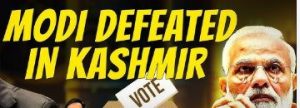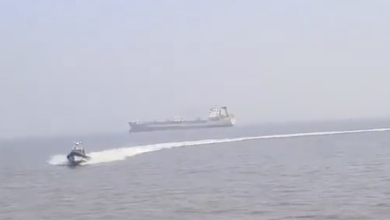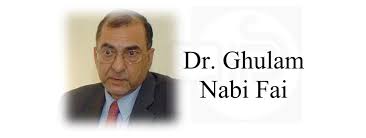 Indian Prime Minister Narendra Modi has described the election results announced in the Occupied Jammu and Kashmir on 9th October as reflective of “the people’s belief in democracy”. As regards the “belief in democracy”, Mr Modi was right; when given the opportunity, the people exercise their rights even under the shadow of guns. Their verdict, even in a controlled environment, showed a clear defeat for the BJP and its RSS-dictated policies rooted in Islamophobia all over the country, especially the IIOJK. Undoubtedly, it was a defeat for Mr Modi and a victory for the Kashmiri people.
Indian Prime Minister Narendra Modi has described the election results announced in the Occupied Jammu and Kashmir on 9th October as reflective of “the people’s belief in democracy”. As regards the “belief in democracy”, Mr Modi was right; when given the opportunity, the people exercise their rights even under the shadow of guns. Their verdict, even in a controlled environment, showed a clear defeat for the BJP and its RSS-dictated policies rooted in Islamophobia all over the country, especially the IIOJK. Undoubtedly, it was a defeat for Mr Modi and a victory for the Kashmiri people.
The election results show that the National Conference (NC), led by Farooq Abdullah, won 42 seats in a house of 90; and its ally, Indian National Congress (INC), secured six seats, thus enabling NC and INC to combine to form a government. Already, Farooq Abdullah has announced that his son, Omar Abdullah, will be the chief minister. The BJP secured 29 seats from the Hindu majority region of Jammu, but failed to secure a single seat in the Muslim majority Kashmir valley despite putting up candidates in 19 constituencies, underscoring complete rejection of the BJP. Media reports suggest most of the BJP candidates lost their deposits.
BJP’s strategy to divide the Kashmir valley’s Muslim vote by propping up people like Engineer Rashid, who emerged as a dark horse in the Lok Sabha elections by defeating Omar Abdullah and Peoples Conference chief Sajad Lone from the Baramulla Lok Sabha seat; he contested his elections from jail and won. Presumably, releasing Engineer Rashid from prison before the state assembly elections would divide the NC-INC alliance’s votes. However, his Awami Ittehad Party (AIP) failed to make an impact and won only a single seat in the Valley.
Occupied Kashmir assembly elections were held after a gap of ten years. Since 5th August 2019, when the Modi government bulldozed articles 370 and 35-A of the Indian constitution that provided special status to the occupied state, the occupied state was not only deprived of statehood status but also both the pro- and anti-India Kashmiri leadership faced worst ever lockdown: complete censorship, internet and social media jamming and thousands of arbitrary arrests, including children’s.
After the National Conference’s success, its leader, Farooq Abdullah, said, “Its (NC’s) mandate was to run the region without ‘Police Raj’ rule and try freeing the people from jail.” His son Omar Abdullah, said in an interview with the NDTV that his party would endeavour to “restore the statehood status of the State”. However, both Abdullahs were visibly cautious of making any sound promises, knowing full well that as a union territory, the occupied state’s political dispensation would not be more than a municipality focusing on health and education. All key powers over security, finances, police and the bureaucracy are now vested in the Lt Governor. Therefore, Mr Omar Abdullah will be sitting as a mayor of the occupied Kashmir rather than exercising his powers as a Chief Minister. According to renowned Indian analyst Radha Kumar, Omar Abdullah’s most significant challenge would be “restoring civil liberties such as free media, right to dissent and protest, which are presently disallowed”.
Some Indian analysts see the Kashmir elections as a sequel to Mr Modi’s recent setback in the general elections. Although he could form the government through coalition partners, his position has been drastically undermined to dictate his agenda, which is mainly influenced by a populist streak and directed at minorities, especially Muslims. Therefore, occupied Kashmir would continue to haunt him for finding a “final solution” to the Kashmir dispute.
Mr Modi may have taken the extreme step of changing the basic structure of the occupied state by dividing it into two union territories: Jammu & Kashmir and Ladakh. The Indian parliament, where BJP enjoyed a two-thirds majority after the 2019 elections, took the extreme measure on 5th August of the same year by revoking articles 370 and 35-A that allowed special status to the disputed state. Even the special status was not accepted by the United Nations as a way out for the exercise of the right to self-determination. The UNSC also rejected the Indian contention in resolutions 91 (1951) and 122 (1957) that holding elections in the disputed state would be tantamount to ascertaining the wishes of Kashmiri people.
There will be different interpretations of the disputed state’s elections. For the BJP, the union territory status of the disputed state would be a lever in the hands of the union government to dictate its agenda through the Lt Governor. The BJP government at the Centre would make sure that the disputed state remains under pressure and continues to take measures towards changing the demography of the state and turn it from a Muslim majority to a Hindu majority state; issuance of domicile certificates to non-resident Kashmiris, mostly Hindus, is vigorously pursued to change the ethno-religious structure of the entire state. How the NC-INC alliance is going to change this basic injustice meted out to the Kashmiris will be the actual test of the pro-Indian coalition.
India has displayed enough intransigence in stonewalling an amicable solution to the seven-decades-old dispute. But it has become obvious ever since that it’s the people of the occupied state who have rejected the Indian rule despite carrot and coercive policies pursued by various governments in New Delhi. Mr Modi’s actions in the occupied state have been described as the most repressive ever since the Kashmir dispute surfaced, but Kashmiris have defeated him with empty hands. The same is true of Pakistan, which has stood by the Kashmiris throughout. Therefore, a reconciliatory approach with Kashmiris and Pakistan is still an option for Mr Modi.








